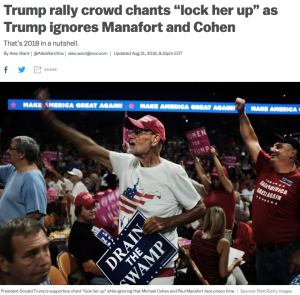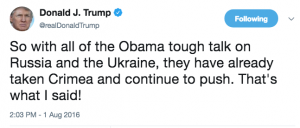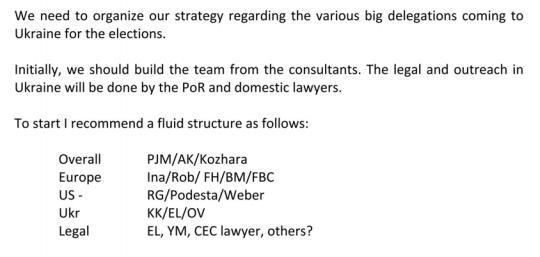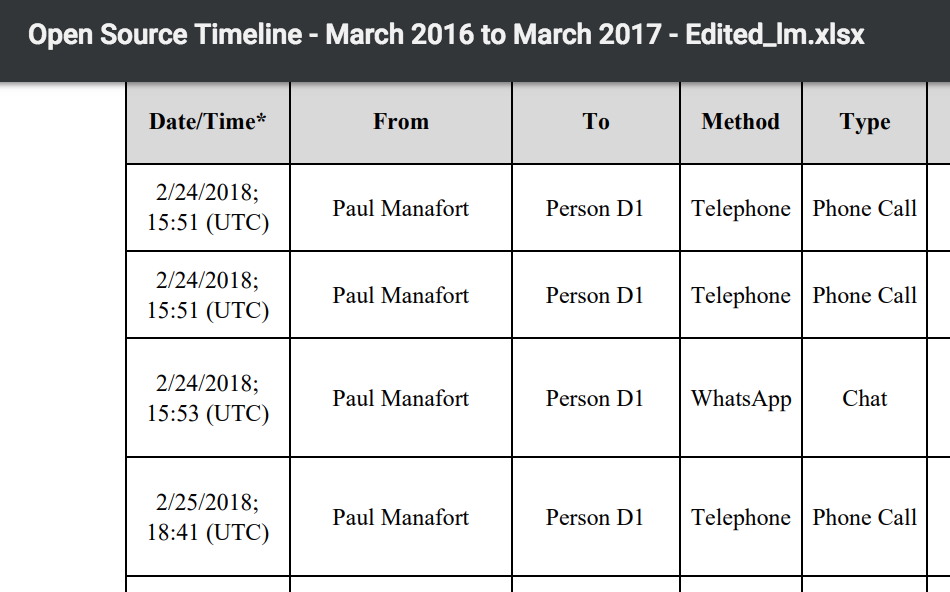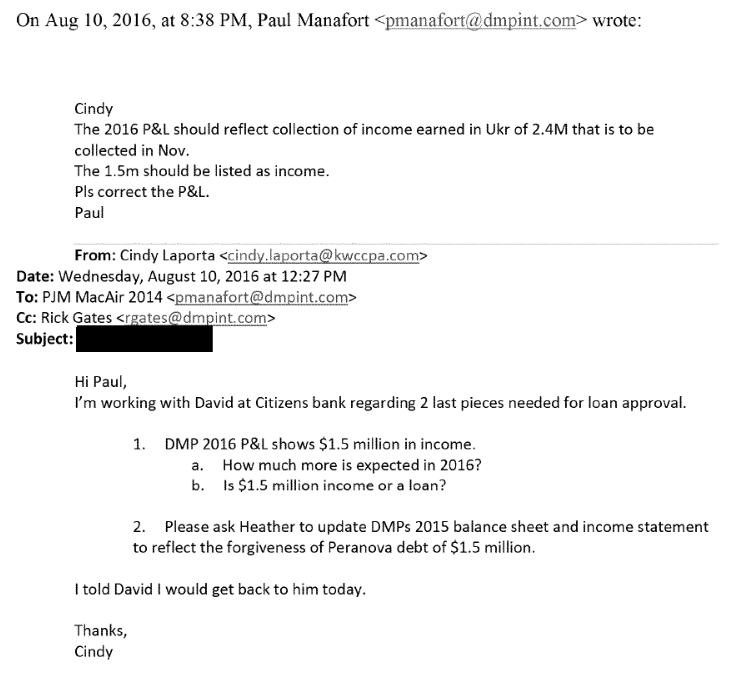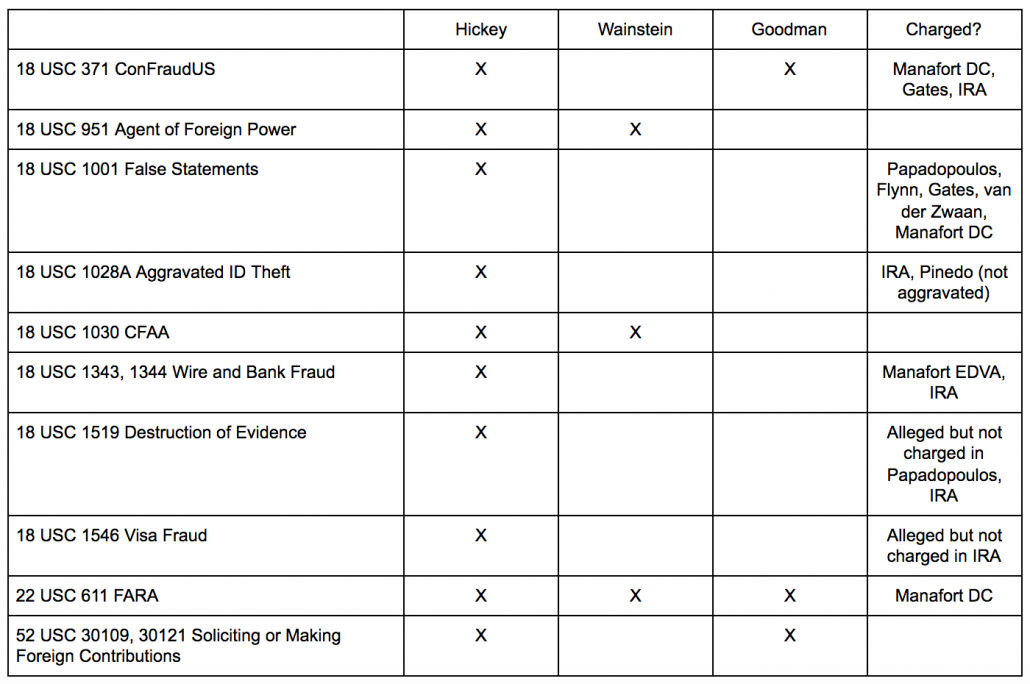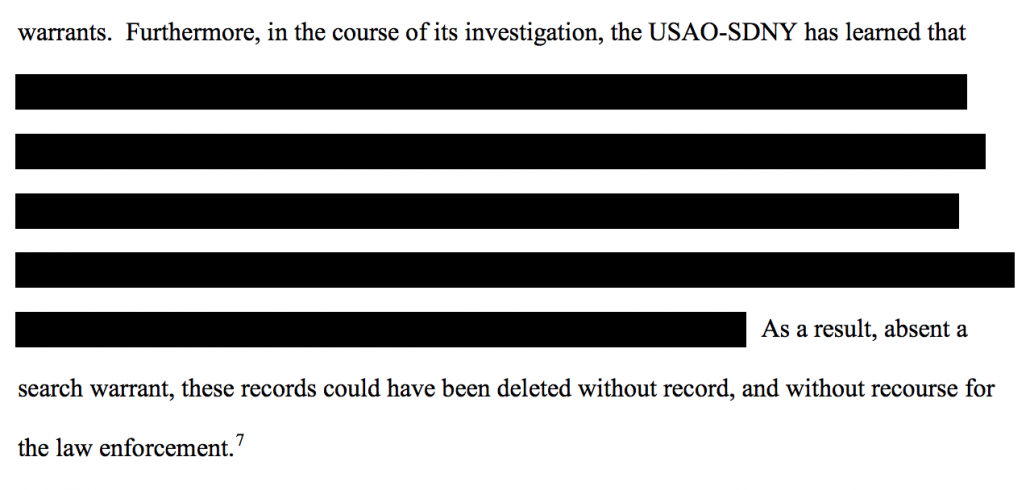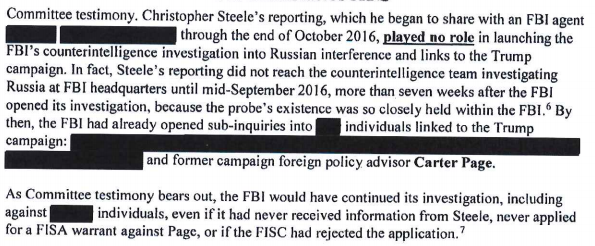Rob Kelner–the Guy Who Signed Mike Flynn’s FARA Filings–Continued to Be Insubordinate in Yesterday’s Hearing
Most of the attention in yesterday’s Mike Flynn sentencing hearing has focused on Judge Emmet Sullivan’s invocation of treason, which I addressed at length here. But — particularly since I have belatedly realized that Rob Kelner is one of the lawyers referred to in the Bijan Kian indictment who filed a FARA registration that, because of lies attributed to Flynn and Ekim Alptekin, ended up being a false statement, I want to look at two bullshit answers Kelner offered yesterday about his little ploy of introducing language on Peter Strzok and Andrew McCabe in Flynn’s sentencing memo.
Taking the second one first, Sullivan asked Kelner to explain why he chose to cite Peter Strzok’s August 22, 2017 302, which had some language about what a successful liar Flynn can be, and not Flynn’s own utterly damning January 24, 2017 302. This was a question directing counsel to explain why he tried to pull a fast one over on the judge. Any responsive answer would have to address that January 24 302 (and wouldn’t need to address the McCabe memo, at all).
But instead of answering that question, Kelner instead tried to use it to attack the Mueller team.
THE COURT: The other puzzling question I have is this: Can you explain for the record why Mr. Flynn was interviewed by the FBI on January the 24th but the 302 cited in his sentencing memorandum is dated August the 22nd, 2017? There’s no reference, and the January 24th is not highlighted at all.
MR. KELNER: Yes, Your Honor. Thank you for the opportunity to address that. I think there’s been some public confusion about that. The original draft of our brief cited specifically to the FD-302 for the interview of Special Agent Strozk and cited it specifically to the McCabe memorandum, and actually originally we intended to include those documents with the filing. Prior to the filing, we shared a draft copy of our brief with the Special Counsel’s Office really for two purposes: One was to make sure that we weren’t including anything covered by the protective order, which they objected to our including, which would, perhaps, have to be redacted or filed under seal; and the other reason, frankly, was generally to understand what their reaction might be to particular points in the filing. After that, the Special Counsel’s Office discussed it with us and asked that we consider removing the Strozk 302, and the McCabe memorandum from the brief and to simply cite to them. Given our position as cooperating in the investigation, we acceded to that. We then sent them a draft of the footnotes that we would use to cite to the relevant documents, and originally those footnotes, as drafted by us, named the McCabe memorandum specifically and named the Strozk 302 specifically so that it would be clear to the reader which documents we were talking about. The Special Counsel’s Office requested that we change those citations to simply reference the memorandum and date and the FD-302 and date without the names. We acceded to that request, and I would add would not have acceded to it if in any way we felt it was misleading, but we respected the preferences of the Special Counsel’s Office.
THE COURT: All right. Any objection to what counsel said? Anything that you wish to add to that?
MR. VAN GRACK: Judge, just one point of clarification.
THE COURT: Sure.
MR. VAN GRACK: Which is what we’ve represented to defense counsel in terms of what to and not to include, what we indicated was anything in the Strozk 302 and the McCabe memorandum that they thought was relevant can and should be included in their submissions. What we asked was that they not attach the documents because, as the Court is aware, there are other considerations in the material there that we wanted to be sensitive to.
Look closely: Kelner never actually answers Sullivan’s question, at all. Instead, he blames the decisions surrounding how those materials were cited in Flynn’s memo (which was not Sullivan’s question) on Mueller’s office.
Mueller’s team probably withheld the filings because there are legal proceedings involving both McCabe and Strzok. You can argue that those legal proceedings served as an excuse to hide embarrassing information and you might even be right. But that doesn’t give you permission to just blow off a legitimate question from the judge.
The second one is, given Kelner’s tenure of representation for Flynn, even more egregious.
Sullivan unsurprisingly expressed difficulty squaring the suggestion that there were extenuating circumstances to Flynn’s brazen lies in his FBI interview with Flynn’s claim that he was accepting responsibility for his actions. So the judge asked Kelner why he included them.
THE COURT: The references that I’ve mentioned that appear in your sentencing memorandum raise some concerns on the part of the Court. And my question is, how is raising those contentions about the circumstances under which Mr. Flynn lied consistent with acceptance of responsibility?
MR. KELNER: Your Honor, the principle reason we raised those points in the brief was to attempt to distinguish the two cases in which the Special Counsel’s investigation has resulted in incarceration, the Papadopoulos and Van der Zwaan cases in which the Special Counsel had pointed out as aggravating factors the fact that those defendants had been warned and the fact that those defendants did have counsel and lied anyway, and we felt it was important to identify for the Court that those aggravating circumstances do not exist in this case relevant to sentencing.
Kelner — the guy who signed a FARA registration that he might have faced his own legal consequences for if it weren’t for his client’s guilty plea accepting responsibility for the lies told in the registration himself — completely ignored Flynn’s FARA lies, both in his answer to this question and the brief generally. Flynn not only had benefit of counsel when he told one of the lies he pled guilty, again, to telling yesterday, Flynn had benefit of his, Rob Kelner’s, counsel.
And Kelner is only avoiding consequences for those FARA filings himself because (the existing story goes) his client is such an egregious liar, he has also lied to him, his lawyer, in the past.
That seems like a pretty major aggravating factor.
Much later in the hearing, when Kelner realized his client was facing prison time, he tried to take responsibility for all the things that showed up in that sentencing memo. Rather than leaving well enough alone, Kelner renewed his bullshit claim that what George Papadopoulos and Alex Van Der Zwaan did was worse than lying to the FBI and hiding your paid ties to a frenemy government. That led to Sullivan pointing out why even just Flynn’s lies to the FBI were, because he was in such an important role, worse than those of Mueller’s other false statements defendants.
MR. KELNER: Your Honor, with your indulgence, if I could make a few points.
THE COURT: Sure.
MR. KELNER: First of all, let me make very clear, Your Honor, that the decisions regarding how to frame General Flynn’s sentencing memorandum made by counsel, made by me, made by Mr. Anthony, are entirely ours and really should not and do not diminish in any way General Flynn’s acceptance of responsibility in this case. And I want to make that —
THE COURT: That point is well taken, but you understand why I had to make the inquiry?
MR. KELNER: I do.
THE COURT: Because I’m thinking, this sounds like a backpedaling on the acceptance of responsibility. It was a legitimate area to inquire about. And I don’t want to be too harsh when I say this, but I know you’ll understand.
[snip]
MR. KELNER: Right. We understand the Court’s reason for concern. I just wanted to make very clear the very specific reasons that those sections in the brief were included, to distinguish the Papadopoulos and Van der Zwaan cases, which did result in incarceration, we think are meaningfully distinguishable in many respects.
THE COURT: Let me stop you on that point, because I’m glad you raised that, and I was going to raise this point at some point. We might as well raise it now since you brought up Papadopoulos and Van der Zwaan. The Court’s of the opinion that those two cases aren’t really analogous to this case. I mean, neither one of those individuals was a high-ranking government official who committed a crime while on the premises of and in the West Wing of the White House. And I note that there are other cases that have been cited in the memorandum with respect to other individuals sentenced in 2017, I believe, for 1001 offenses, and the point being made — and I think it’s an absolutely good point — the point being made that no one received a jail sentence. My guess is that not one of those defendants was a high-ranking government official who, while employed by the President of the United States, made false statements to the FBI officers while on the premises of and in the West Wing of the White House. That’s my guess. Now, if I’m wrong, then you can point me to any one or more of those cases. This case is in a category by itself right now, but I understand why you cited them. I appreciate that.
MR. KELNER: Your Honor, we don’t disagree. We recognize that General Flynn served in a high-ranking position, and that is unique and relevant. But I —
THE COURT: Absolutely.
But Kelner took that comment, and kept digging, claiming that Flynn’s cooperation should be worth more because his cooperation was more “consequential” than that of the little people.
MR. KELNER: But I would submit to you a couple of points in response for the Court’s consideration. Number one, because of his high rank and because of his former high office, when it came time to deal with this investigation and to deal with the Special Counsel’s Office, that, too, set a higher standard for him, and he did understand that as a three-star general and a former National Security Advisor, what he did was going to be very consequential for the Special Counsel’s investigation, and very consequential for the nation, so he made decisions early on to remain low profile, not to make regular public statements, as some other people did. That was acknowledged by the Special Counsel’s Office when we did first hear from them, the value of that silence. And then he made the decision publicly and clearly and completely and utterly to cooperate with this investigation, knowing that, because of his high rank, that was going to send a signal to every other potential cooperator and witness in this investigation, and that was consequential, and we appreciate the fact that the Special Counsel memorialized that in his brief. That did make a decision, and that was another kind of high standard that was set for him and that he rose to and met decisively. In addition, there have been other cases —
Sullivan interrupted Kelner at this point, perhaps in an effort to get him to stop damaging his client. It didn’t work though, because having argued that Flynn’s efforts to undo his lies were worth more than that of the little people, Kelner then … brought up David Petraeus.
THE COURT: Can I just stop you right now? Is — How do you wish to proceed? Do you wish to proceed with sentencing today or do you want to defer it?
MR. KELNER: Thank you, Your Honor.
THE COURT: Or are you leading up to that point?
MR. KELNER: I’m leading up to that.
THE COURT: No, that’s fine.
MR. KELNER: Just a bit of indulgence, if I may.
THE COURT: No, no. Go ahead. That’s fine.
MR. KELNER: And let me just finish that last point.
THE COURT: No, no, no. I’m not trying to curtail you. I just wanted to make sure I didn’t miss anything.
MR. KELNER: I’m building up to it. I’m building up to it, Your Honor.
THE COURT: All right.
MR. KELNER: In addition, I would note there have been other high profile cases, one involving a four-star general, General Petraeus.
THE COURT: I don’t agree with that plea agreement, but don’t —
MR. KELNER: It’s a classic —
THE COURT: He pled to a misdemeanor?
Right before Sullivan closed the hearing, he expressed his disapproval of that sentence once again with Kelner, presumably as a warning not to argue Flynn should get light treatment, like Petraeus did, because he’s an important decorated general.
While bringing up the double standard the Obama Administration used with Petraeus is totally fair game, especially in Espionage-charged leak cases (which this is not), this was an instance where Kelner either couldn’t hear or didn’t give a fuck about what the judge had already told him, which is that, having read all the sealed underlying documents, he believes the stuff Flynn lied about “is in a category by itself.”
Honestly, if I were Mike Flynn and I had the money I’d fire Kelner after recent events, because — even if Kelner is not responsible for the ploy that badly backfired (and I suspect he’s not, at least not entirely) — by returning to sentencing with a different lawyer, you can try to start fresh with Sullivan, whom you’ve already pissed off.
But it’s not clear that Flynn can do that.
Because while firing Kelner might permit Flynn to claim he had nothing to do with this disavowal of responsibility that Kelner is now claiming responsibility for, Kelner’s still required to claim that Flynn is responsible for the false statements submitted in a document signed by Kelner back in 2017.
More importantly, according to Kelner, the Kian trial is the only thing left for Flynn to offer as far as cooperation.
Nothing has been held back. That said, it is true that this EDVA case that was indicted yesterday is still pending, and it’s likely, I would think, that General Flynn may be asked to testify in that case. We haven’t been told that, but I think it’s likely, and he’s prepared to testify. And while we believe that the Special Counsel’s Office views his cooperation as having been very largely complete, completed at this point, it is true that there’s this additional modicum of cooperation that he expects to provide in the EDVA case, and for that reason, we are prepared to take Your Honor up on the suggestion of delaying sentencing so that he can eke out the last modicum of cooperation in the EDVA case to be in the best position to argue to the Court the great value of his cooperation.
It seems likely that if Kian goes to trial, it will be Kelner’s testimony, not Flynn’s, that might be most important.
Kelner and Flynn are yoked together, Kelner to the lies Flynn told him to file in that FARA filing, and Flynn to the insubordinate effort to dismiss the importance of Flynn’s lies.
As I disclosed in July, I provided information to the FBI on issues related to the Mueller investigation, so I’m going to include disclosure statements on Mueller investigation posts from here on out. I will include the disclosure whether or not the stuff I shared with the FBI pertains to the subject of the post.



